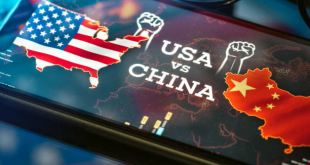
SONG CHEN/CHINA DAILY
Since its founding, the Forum on China-Africa Cooperation has proved to be an effective platform for deepened and upgraded interaction
In May 2000, the British magazine The Economist released an issue with a cover labeling Africa “the hopeless continent”, which suggested that the world might give up on the continent. However, that only represented the Western perspective. China believed Africa was a promising continent and it was ready to build a new platform with Africa for shared development. Five months later, in October 2000, the Forum on China-Africa Cooperation was founded in Beijing, inaugurating a new era of China-Africa relations and African development.
From 2000 to 2010, the FOCAC showed its strength in promoting China-Africa cooperation and African development. China-Africa trade grew from $10.6 billion in 2000 to $106.8 billion in 2008 at an annual growth rate of over 30 percent, and China became Africa’s largest trading partner. Those 10 years also witnessed rapid development in Africa with an annual economic growth of 5 percent to 10 percent. In December 2011, The Economist changed its tune on Africa and put “Africa Rising” on its cover, admitting that huge changes were happening in Africa and that it possibly had a bright future.
Over the years, China and Africa have forged ahead. They have strengthened their political trust and high-level interactions, boosted economic and trade cooperation and enhanced cultural and people-to-people exchanges, which have brought benefits to both the Chinese and African peoples.
From 2010 to 2020, as the FOCAC further matured, China-Africa cooperation deepened and upgraded. In 2019, China-Africa trade reached $208.7 billion, 20 times what it was in 2000, and China has been Africa’s top trading partner for 11 years in a row. At the same time, the direct Chinese investment stock in Africa approached $49.1 billion, a 100-fold increase on the amount in 2000.
China-Africa cooperation continues to unleash great potential. Since China has actively participated in improving the connectivity in Africa, more than 6,000 kilometers of railways and the same mileage of roads, and nearly 20 ports and over 80 large-scale power plants have been built in different African countries. These infrastructures have laid a solid foundation to build a modern logistics system in Africa, supporting Africa to integrate into the global industrial and supply chains.
Besides promoting cooperation in trade, investment, infrastructure and connectivity, the FOCAC has also played a positive role as a platform for collective dialogue between China and Africa. For African countries, China is an important partner, and the FOCAC provides a platform to communicate this. For China, it welcomes African countries aboard the express train of its development, and the FOCAC provides a pilot platform to advance South-South cooperation, to build a community with a shared future for mankind, and to advocate global governance reforms and a new model of international relations.
Under the framework of the FOCAC, more mechanisms for science and education, and cultural and people-to-people exchanges have been built, demonstrating a shift to a non-government-driven form. Take the Institute of African Studies at Zhejiang Normal University as an example. It co-organized a seminar to commemorate the 10th anniversary the FOCAC in Pretoria in November 2010, when then Vice-President Xi Jinping attended the opening ceremony and delivered a speech. Following the guidance of Chinese and African leaders, we established the China-Africa Think Tank Forum (CATTF) in 2011, creating a platform for Chinese and African think tanks to exchange ideas. At the CATTF conference in 2013, the China-Africa Think Tanks 10+10 Partnership Plan was launched, and the China-Africa High-Level Dialogue Conference on Fighting Against Poverty for Common Prosperity was held in the headquarters of the African Union in Ethiopia in 2017.
Via CATTF, Chinese and African experts have conducted candid, in-depth exchanges on development, all-round cooperation and issues of concern. The CATTF has become a special platform for building consensus and coming up with innovative ideas that can be translated into policies and mechanisms. It is also a vivid epitome of the robust people-to-people exchanges and cultural communication between China and Africa.
Through these equal dialogues and multiple exchanges, concepts and ideas drawn from China’s development experience have been increasingly discussed, including development planning, reform and opening-up, self-reliance and unremitting diligence, good governance, and capacity building; and the principles and wisdom that have been attained through China-Africa practical cooperation have been spread, including sincerity, real results, amity and good faith, and pursuing the greater good and shared interests. In this process, Chinese and African people have deepened their civilizational exchanges and mutual learning, and worked together to create new knowledge for humanity, and complemented the Western views and theories on world history and human civilizations.
With the efforts of both Chinese and African people, the FOCAC has fostered a new development paradigm for developing countries, and set a new benchmark of mutually beneficial international cooperation, its experience will transcend time and place to establish a shining example in building a community with a shared future for mankind.
Today, the world is being reshaped, while China-Africa relations have come to the best time in the history. With humanity at a crossroads in its development course, the Chinese and African civilizations will add impetus and inspiration to the development of human civilizations.
The author is the director of the Institute of African Studies at Zhejiang Normal University, and initiator of the China-Africa Think Tank Forum.
China Daily
 Africa -China Review Africa -China Cooperation and Transformation
Africa -China Review Africa -China Cooperation and Transformation
